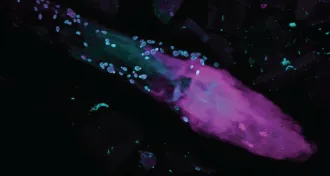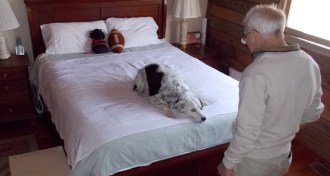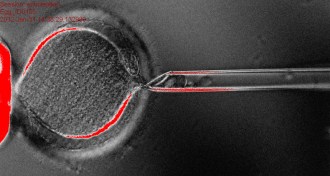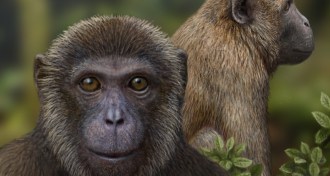News
-
 Life
LifeFoot fungi a thriving, diverse community
A skin census finds that toes and heels have the most fungal types.
By Meghan Rosen -
 Life
LifeExperimental vaccine protects against many flu viruses
Ferrets that receive shot can fight off variety of influenza strains.
-
 Psychology
PsychologyDog sniffs out grammar
After years of word training, a canine intuitively figures out how simple sentences work.
By Bruce Bower -
 Life
LifeViruses and mucus team up to ward off bacteria
Phages may play an unforeseen role in immune protection, researchers find.
-
 Life
LifeInvasive frogs may spread deadly amphibian fungus
African clawed frogs imported for 20th century pregnancy tests apparently communicate B. dendrobatidis to native species.
By Susan Milius -
 Space
SpaceKepler mission may be over
The planet-hunting telescope has been crippled by the failure of two out of four pointing devices.
By Andrew Grant -
 Animals
AnimalsMalaria parasite drives mosquitoes to human scent
Compared to uninfected insects, ones carrying disease land more often on sweat-soaked stockings.
-
 Life
LifeCloning produces human embryonic stem cells
Fine-tuning of technique used in other animals could enable personalized medicine.
By Meghan Rosen -
 Physics
PhysicsLow-energy laser makes leap toward practicality
Researchers have created a polariton device that runs on electricity.
By Andrew Grant -
 Animals
AnimalsTamed fox shows domestication’s effects on the brain
Gene activity changes accompany doglike behavior in foxes bred over more than 50 years.
-
 Life
LifeFossils point to ancient ape-monkey split
Apes and monkeys split from a common ancestor more than 25 million years ago, fossil finds suggest.
By Bruce Bower -
 Earth
EarthGroundwater isolated for eons
At least 1.5 billion years after it last saw the surface, flowing liquid may host life.
By Erin Wayman